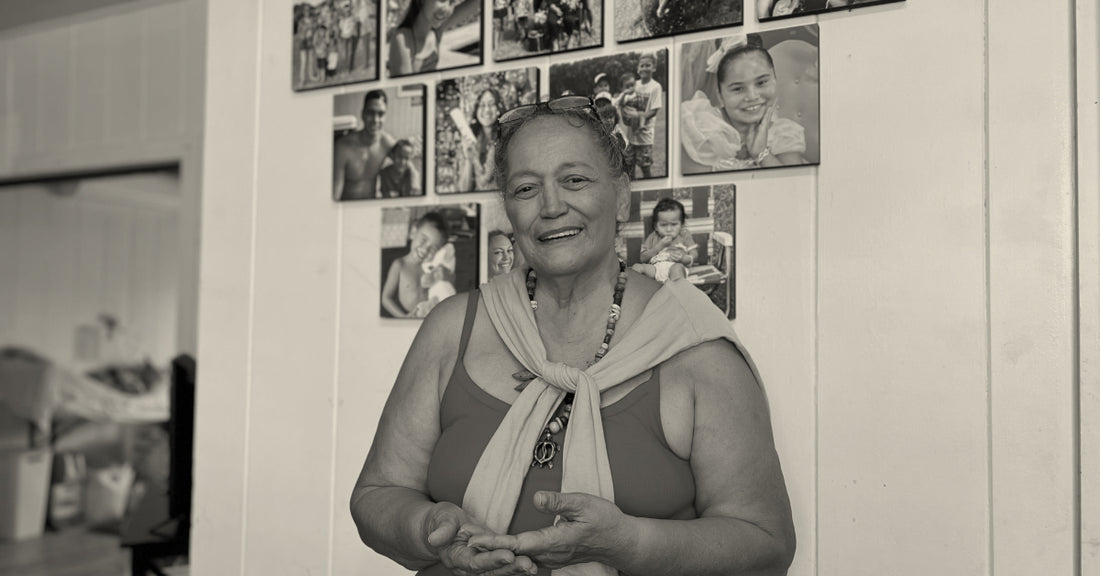As a cultural ambassador, Puna Kalama Dawson has traveled the world to share the indigenous wisdom and traditions of Hawaii. Through a multimedia presentation called “In the Name of Aloha,” she immerses international audiences in the dance, language, music, lore and spirituality of her homeland. At the core of it all is a universal—and beautiful—message of compassion and reverence for life.
Breaking the word Hawaii down syllable by syllable, she explains that hā represents the breath, wai signifies the birth mothers we come from and i is short for IʻO na lani, which she describes as “God most high” and “the purest of the purest.”
“Ha-wai-i is a description of man who is kind,” she offers. “Being man-kind is being responsible, appreciative of everything that we’ve had from the past, taking care of it now, in the present, so that it’s going to be there in the future.”
According to Dawson, Hawaiian values rest on three foundational pillars: family, water and land. “Imagine if our governments all took that into consideration before they made any choices or any decisions,” she muses. “The decision that I make—how will it affect my family? How will it affect my resources? How will the decision I make regarding the land affect all of us?”
Hawaii’s Origin Story
Dawson played a key role in gathering the dancers, musicians, farmers, canoe paddlers and other native Hawaiians seen and heard in MUD\FILMS’ new short film Haloa. The film tells Hawaii’s creation story, in which the goddess Hoʻohokukalani gives birth to a stillborn child, Haloa. After Haloa is buried facing the rising sun, a kalo (taro) plant grows from his grave. Hoʻohokukalani later gives birth to another child, the first indigenous Hawaiian, who is also given the name Haloa.
As Dawson explains, in indigenous cultures throughout the world, Hawaii is understood to be the older brother. “Haloa was the firstborn, and when he was born, he was put into the earth, because that was the purpose of Older Brother,” she says.
The kalo plant growing from Haloa’s grave in this story reflects taro’s key role in Hawaii’s economy and history. “In understanding Haloa, if you think about the different foods that were brought to our earth in all of the other cultures, you’ll find that these were the things that were sustenance,” Dawson notes. “They represented more than just the food that you ate; it was a knowledge that came with it. So in our culture, the taro, which is haloa, is the sustenance. When we partake of that food, it is like we’re ingesting not just the food, but the intention of the food in relationship.”
Puna’s Daily Practice
Haloa is part of MUD\FILMS’ Rituals series, which explores the relationship between our quality of life and the nourishment that we consume. When Trends w/ Benefits asks Dawson if she has any daily rituals that help keep her healthy in body, mind and spirit, she chuckles at the use of the word ritual, opting to describe her daily practice as “something that happens” to all kupuna (honored Hawaiian elders). By Dawson’s description, this practice, E Ala, simply consists of greeting the sun.
“It is when it’s completely pō—it’s dark,” she says. “If you take the time to acknowledge the sun as it’s coming up out of the horizon, what happens is it gives you energy to all of the areas of your body to enlighten it. At conception, all of our lights are turned on. And when we are in timeless discernment, we can go back to that light; we can go back to that place.”
Dawson mentions that her grandfather partook of this practice each day until the last two days of his life. She adds, “It is also at that time that we are in thanks-giving. Here in Hawaii, we have the sun and the moon in the sky at the same time, we have the rainbows … I mean, we have every entity of light that awakens the spirit. Why do people want to come here? They’re drawn, because we also have the path to Earth, and we have the path to Heaven. People come from all over the world for that reason. It’s like coming home.”
Damon Orion is a writer, musician, artist and teacher based in Santa Cruz, CA. He has written for Revolver, Guitar World, Spirituality & Health, Classic Rock, High Times and other publications. Read more of his work here.
Read more: Eat One Wild Thing Every Day
Read more: Koa Smith’s Daily Rituals




